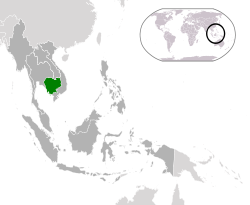Cambodia Trains New Riot Police
By RFA
More than Cambodian 400 anti-riot police officers have completed training in the suppression of protests and dismantling of roadblocks, raising fears among rights groups and workers’ unions that the authorities may use excessive force against demonstrations.
Phnom Penh police chief Touch Naruth said however that the specially trained force from among officers from eight districts of Cambodia’s capital Phnom Penh will not be used to “crack down” on protesters.

“We should not use the words ‘crack down,’” he said, adding that the group’s training provided by Cambodia’s Ministry of the Interior and National Police Commission has been focused mainly on deterring demonstrators from violent protest.
“We should say ‘prevent,” he said.
In February, protests turned violent as a group of around 2,000 garment workers blocked a national highway and vandalized a Chinese-owned factory they said had refused to implement benefits ordered by a labor arbitration body.
Police—outnumbered and unarmed—chose not to intervene.
Equipped with riot gear and carrying automatic rifles, the newly trained 400-member anti-riot unit performed a drill on Tuesday in which they quickly suppressed a protest by about 50 “demonstrators.”
Unit ‘will follow orders’
Em Saravuth, a spokesman for the police trainees, told witnesses to the drill that the new unit will strictly follow orders issued by the Interior Ministry and the police.
“We will try to prevent all crimes in the city,” he said.
Moeun Tola, labor program director at the Community Legal Education Center, said however that Cambodian police have used violent force against peaceful protesters in the past.
“Police officers should not use violent force against the people,” he said, adding that Cambodia has signed and ratified United Nations agreements defending human rights and opposing the use of torture.
Prominent unions have expressed concern over the safety of garment workers, noting that police attacked and injured at least 20 female employees of garment factories in late July.
“Phnom Penh police officers violently abused the workers,” said Cambodian Confederation of Unions president Rong Chhun.
“Violent crackdowns have increased,” he said.
Reported by Sok Serey for RFA’s Khmer service. Translated by Samean Yun. Written in English by Richard Finney.

Of course the Cambodian government will use these riot police to suppress and crack down on peaceful protesters. The government is worried that prolong protests by the people will lead to civil unrest and revolution like in the case of Syria and other middle countries. Dictators will eventually be toppled by the people. Hun sen will do anything at all costs to avaoid this fate like other dictators before him. Khmer people are now fed up and have been suppressed and marginaized by hun sen government for too long. hun sen will never escape his bad karma which has been inflicted on Khmer people for the past 30 years.
The situation is different from the middle east but the government now is similar to the Lon Nol government which led to the Khmer Rogue. Given their demographics (50% of people under 20) and high unemployment or underemployment crime and civil unrest will occur. The difference here and the middle east is more cultural. Cambodia will undoubtedly see civil unrest again if history is any guide.
I think this is a good idea to have elite police to protect good citizens. I was in Cambodia this winter and I felt pretty secure, thanks to all the police hard work !